When I finally admitted my attention span was wrecked, I went hunting for books that help master deep focus instead of yet another “hacky” productivity app. Over the last few years, I’ve worked through a small stack of book to improve concentration that changed how I think, work and even rest.
This article is my personal, practical walkthrough of seven titles that stood out. Think of it as a curated deep work and productivity reading list rather than a random pile of self-help.
We’ll look at:
- Why our focus is collapsing in the first place
- How each book approaches attention from a different angle: habits, systems, psychology, even politics
- A brief summary, the core premise, and five concrete take-aways from each book so you can decide what to read first
Along the way I’ll naturally reference some of the phrases you might be searching for—like the best books for improving concentration, books on overcoming digital distraction, and the psychology of flow state books—because that’s exactly what these are.
Table of Contents
Why I Went Looking for Attention Span Restoration Guides
My breaking point was embarrassingly small: I couldn’t get through a single page of a book without checking my phone.
I’d sit down to do serious work and somehow end up:
- “Just checking” email
- Refreshing social feeds
- Reading five tabs of news and none of my actual project brief
It felt less like a willpower problem and more like my brain had been re-wired. That’s when I stopped looking for yet another to-do app and started looking for attention span restoration guides—books that explained why this was happening and how to take my attention back.
What I discovered is that there isn’t one magic solution. Instead, the books that help master deep focus tend to fall into a few overlapping categories:
- Deep work & systems: How to engineer long, focused blocks of time
- Habits & triggers: How to stop being yanked around by notifications, urges, and busywork
- Values & priorities: How to decide what actually deserves your attention
- Environment & society: How the modern world is actively stealing our focus
The seven books below cover all of that. Together, they’ve become my go-to Books on overcoming digital distraction and rebuilding real concentration in an always-on world.
1. Deep Work (2016) by Cal Newport
Brief Summary
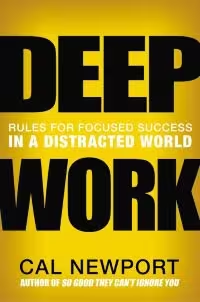
Deep Work argues that the ability to focus without distraction on cognitively demanding tasks is becoming both rarer and more valuable. Newport calls this “deep work,” and contrasts it with “shallow work” (emails, meetings, admin). He shows how careers—and lives—are transformed when you deliberately design your schedule around deep focus.
Core Premise
If you want meaningful results in a distracted world, you must treat focus as a skill to train, not a mood to wait for. The more time you spend in deep work, the more value you create and the more irreplaceable you become.
5 Key Take-aways
- Schedule deep work like a meeting.
Don’t wait to “find time.” Block 60–90 minute chunks on your calendar and protect them aggressively. - Rituals make focus easier.
Same place, same tools, same starting routine. When I repeat a simple ritual (coffee, headphones, one open document), my brain knows it’s time to go deep. - Embrace boredom.
If you always reach for your phone in micro-gaps, you train your mind to expect stimulation. Newport’s advice: occasionally do nothing so your brain relearns how to stay with a task. - Quit (or severely limit) low-value digital tools.
Instead of asking, “Could this be useful?” ask, “Does this tool produce enough value to justify its distraction cost?” - Drain the shallow.
Track how much shallow work you do in a day and set a hard upper limit. The less shallow noise you tolerate, the more time you free for deep work.
If you want a foundational deep work and productivity reading list, Deep Work is the place to start.
2. Indistractable (2020 / updated 2025) by Nir Eyal
Brief Summary
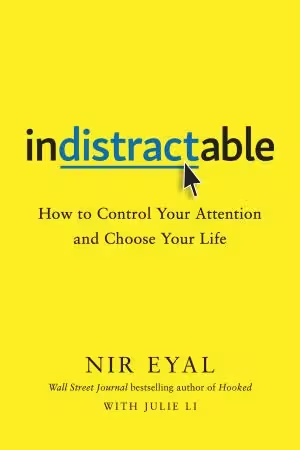
Indistractable digs into why we get pulled away from what we intend to do.
Eyal argues that distraction starts inside us (with discomfort) before it ever shows up as a notification.
The book offers a framework for mastering internal and external triggers, timeboxing your calendar, and aligning your actions with your values.
Core Premise
You don’t “have” attention; you allocate it. Becoming “indistractable” means designing your environment, schedule, and habits so they naturally pull you toward traction (what you meant to do) instead of distraction.
5 Key Take-aways
- Internal triggers drive most distraction.
We scroll or snack not just because of apps, but to escape boredom, anxiety, or fatigue. Notice the feeling behind the urge. - Timebox your values.
Instead of a vague to-do list, put your priorities directly onto your calendar—work, relationships, health, even rest. - Turn your phone, apps, and browser into allies.
Remove icons from your home screen, turn off non-critical notifications, and use site blockers during focus blocks. - Pre-commit with “pacts.”
Effort pacts (like leaving your phone in another room) and price pacts (like apps that charge you when you break a rule) make distraction more costly than staying on task. - Make traction a shared norm.
Eyal shows how to create “indistractable” agreements with family and colleagues so your new habits aren’t constantly undermined.
If you’re hunting for Books on overcoming digital distraction, Indistractable is hands-down one of the most practical.
3. Hyperfocus (2018) by Chris Bailey
Brief Summary
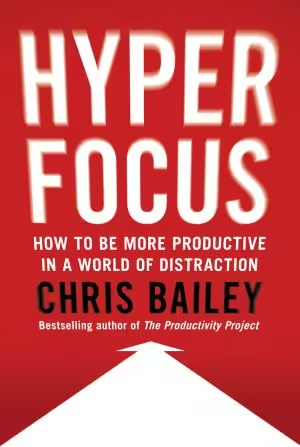
Bailey introduces two complementary modes of attention: Hyperfocus (deep concentration on one meaningful task) and Scatterfocus (intentional mind-wandering that fuels creativity).
The book teaches you how to enter and maintain each state on purpose.
Core Premise
Attention is your most limited resource. By managing your “attentional space”—what fits in your mind at once—you can deliberately shift between intense focus and relaxed creativity.
5 Key Take-aways
- One important object of attention at a time.
Hyperfocus = keeping one important, complex object in your awareness as you work. Multitasking simply slices your attention into useless fragments. - Shrink the “open loops.”
Write down anything that tugs at your attention while you’re focusing. Once captured, it stops hijacking your mind. - Use Scatterfocus strategically.
Walks, showers, and boring chores are perfect for “background processing.” Instead of doom-scrolling, give your brain room to connect dots. - Guard your attentional space from noise.
Visual clutter, chat pings, and half-open tabs all steal slices of attention. Simplify your workspace before you start. - Measure your day in quality attention, not hours.
A few truly hyperfocused hours often beat an entire day of semi-distracted effort.
If you’re fascinated by the Psychology of flow state books, Hyperfocus is a very approachable, science-backed place to deepen your understanding.
4. The One Thing (2013) by Gary Keller & Jay Papasan
Brief Summary
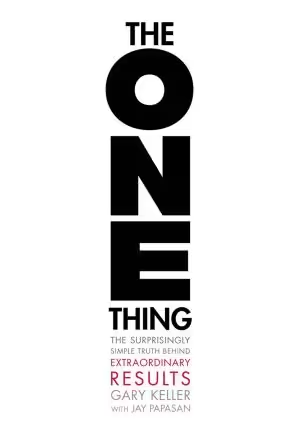
Focus is often lost because we try to do too many things. Success is sequential, not simultaneous.
You must identify the single most important task that renders other tasks easier or unnecessary.
The One Thing is built around a single question:
“What’s the ONE thing I can do such that by doing it everything else will be easier or unnecessary?”
The authors argue that extraordinary results come from extreme focus and priority, not “balance” or juggling everything.
Core Premise
Most of us fail not because we’re lazy, but because we’re trying to do too many things at once. When you identify and commit to your highest-leverage “one thing,” progress compounds.
5 Key Take-aways
- The focusing question.
Ask that ONE-thing question for your life, your year, your month, your week, and your day. It cuts through noise astonishingly fast. - Multitasking is a lie.
Task-switching leaks time and energy. Batch similar tasks and protect your key block of the day for your highest-value work. - Willpower is a limited resource.
Do your “one thing” when your energy is highest (usually early in the day), before shallow tasks drain you. - Time block your priority.
Treat your one thing like a non-negotiable appointment with your future self. Guard it from meetings, calls, and “urgent” favors. - Think big, act small.
The book pairs ambitious goals with narrow focus: choose a bold destination, then keep asking what the next most important domino is.
If you want the Best books for improving concentration and cutting through overwhelm, The One Thing earns its permanent place on that shelf.
5. Make Time (2018) by Jake Knapp & John Zeratsky
Brief Summary
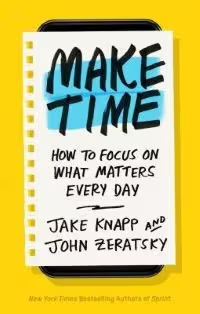
Written by two former Google designers, Make Time is an antidote to toxic busyness.
Instead of trying to “do it all,” they offer a flexible four-step daily framework—Highlight, Laser, Energize, Reflect—to help you create time for what really matters.
Core Premise
The modern “default” settings (constant connectivity, endless feeds, reactive work) steal our hours. You can redesign your days like a product: tweak small settings until your time lines up with your priorities.
5 Key Take-aways
- Choose a daily Highlight.
Each morning, pick one thing that would make the day feel well spent—deep work, a workout, a family activity—and build your schedule around it. - Laser = beating distraction.
Adjust your devices ruthlessly: remove time-sink apps, log out of accounts, and use physical boundaries (like a phone in another room) during focus blocks. - Energize your body to fuel your brain.
Short walks, better sleep, and simple food changes have a huge impact on focus. You can’t out-willpower a sleep-deprived brain. - Reflect to improve the system.
At the end of the day, jot down what worked and what didn’t. Make Time treats focus as an experiment, not a rigid system. - Think in tactics, not rules.
The book offers 80+ small tactics (like “distraction free phone,” “reset your room,” “find your caffeine sweet spot”) so you can mix and match what fits you.
If you’re tired of rigid productivity systems and want friendlier Improve Concentration Books, Make Time feels like talking to two nerdy friends who’ve tried every experiment for you.
6. Stolen Focus (2022) by Johann Hari
Brief Summary
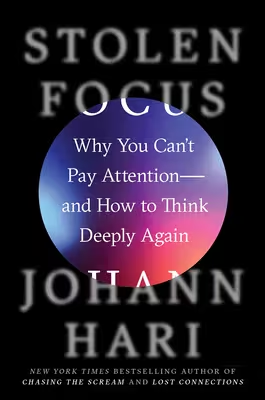
Stolen Focus zooms out from individual habits and looks at the bigger picture: why our collective ability to pay attention is collapsing.
Hari travels the world interviewing scientists, activists, and everyday people to identify systemic forces—social media, pollution, stress, broken diets, surveillance capitalism—that are hijacking our minds.
Core Premise
Your struggles with concentration are not just your fault. Powerful external systems are designed to fragment your attention. Real focus requires both personal strategies and societal change.
5 Key Take-aways
- It’s not just your willpower.
Hari argues we’ve been blaming ourselves for what are largely structural problems: addictive tech, overwork, poor sleep, and more. - There are at least 12 causes of the focus crisis.
From constant switching, to loss of deep-reading, to environmental toxins, attention is under assault from many directions at once. - Tech is engineered for distraction.
Infinite scroll, notifications, and engagement-driven algorithms are not neutral—they’re designed to keep you hooked. - You can build pockets of deep life.
Despite the grim diagnosis, Hari shares stories of schools, workplaces, and families who’ve redesigned their environments around focus. - Attention is a moral and political issue.
Protecting focus isn’t just about productivity; it’s about democracy, mental health, and our ability to solve big problems together.
If you’re looking for Attention span restoration guides that go beyond “just delete your apps,” Stolen Focus will both unsettle and empower you.
7. Essentialism (2014 / 2024 10th Anniversary Edition) by Greg McKeown
Brief Summary
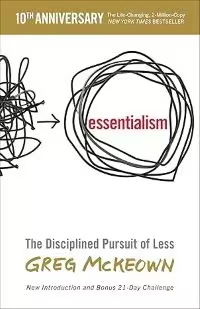
Essentialism: The Disciplined Pursuit of Less is about doing fewer things, better.
McKeown shows how to identify what is truly essential in your life and systematically eliminate everything that isn’t, so your time and energy are no longer spread paper-thin.
Core Premise
You can’t be focused if your life is overloaded. Essentialism is the practice of relentlessly prioritizing—choosing “the right thing, in the right way, at the right time”—and letting go of everything else.
5 Key Take-aways
- If you don’t prioritize your life, someone else will.
Saying “yes” by default hands your agenda to other people. Essentialists learn to pause and choose intentionally. - Do less, but better.
Instead of squeezing more into your day, raise the bar for what deserves a place in it. Depth beats breadth. - The power of “no.”
McKeown treats “no” as a skill: you can decline gracefully, with clarity and respect, while protecting your focus. - Create buffers for the unexpected.
Overcommitted schedules leave no room for surprises. Essentialists leave margin—time, money, energy—so crises don’t derail everything. - Make focus a lifestyle, not a sprint.
Essentialism isn’t a one-time declutter; it’s an ongoing discipline of reviewing commitments and cutting non-essentials.
Among modern books that help master deep focus, Essentialism is the one I revisit when my calendar starts to bloat and my “deep work” time mysteriously disappears.
How to Use This Deep Work and Productivity Reading List
You definitely don’t need to read all seven books at once. Here’s how I’d approach this deep work and productivity reading list depending on where you are:
- If you want raw, practical focus skills: Start with Deep Work, Indistractable, and Hyperfocus.
- If you feel overwhelmed and overcommitted: Go to The One Thing and Essentialism.
- If your days feel busy but empty: Try Make Time for a gentler redesign of your schedule.
- If you suspect the problem is bigger than you: Read Stolen Focus to understand the context you’re fighting against.
7 books to master deep focus
| Book (Year) | Author(s) | Core idea about focus |
|---|---|---|
| Deep Work (2016) | Cal Newport | Train the ability to work in distraction‑free concentration on cognitively demanding tasks and limit shallow work. |
| Indistractable (2020/2025) | Nir Eyal | Control external and internal triggers; use timeboxing to stay focused on what matters. |
| Hyperfocus (2018) | Chris Bailey | Keep one important, complex object in your awareness; manage attentional space and create distraction‑free environments. |
| The One Thing (2013) | Gary Keller & Jay Papasan | Cut through distractions and focus on the single most important task to achieve extraordinary results. |
| Make Time (2018) | Jake Knapp & John Zeratsky | Rethink daily routines with a four‑step framework (Highlight, Laser, Energize, Reflect) to dedicate time to what matters. |
| Stolen Focus (2022) | Johann Hari | Our attention crisis is systemic; identify external forces stealing focus and fight to reclaim attention. |
| Essentialism (2014/2024) | Greg McKeown | Do less but better; eliminate non‑essential tasks and focus on what is truly important. |
FAQ
Q: What are the best books that help master deep focus right now?
A: Seven strong options are Deep Work, Indistractable, Hyperfocus, The One Thing, Make Time, Stolen Focus, and Essentialism. Together they cover habits, systems, mindset, and the wider world.
Q: Where should I start if my phone is my main problem?
A: Begin with Indistractable and Make Time—they’re very actionable Books on overcoming digital distraction that help you redesign your device usage and daily routines.
Q: Which book explains the psychology behind focus and flow states?
A: Hyperfocus digs into attentional space and how to manage it, making it one of the more accessible Psychology of flow state books on this list.
Q: I’m overwhelmed and can’t decide what to work on. Which book will help?
A: The One Thing and Essentialism are the strongest Improve Concentration Books for narrowing your priorities so your focus actually has somewhere meaningful to land.
Conclusion
Working through these seven books that help master deep focus changed my mindset from “I’m just bad at concentrating” to “focus is a trainable skill.”
Each author attacks the problem from a slightly different angle—habits, environment, values, even politics—but the message is consistent: in a world designed to distract you, deep attention has become a superpower.
For me, Deep Work and Hyperfocus gave me the mechanics of focus; Indistractable and Make Time helped me tame my devices and days; The One Thing and Essentialism forced me to choose what actually deserves my energy; and Stolen Focus reminded me that my attention struggles aren’t just a personal failing.
Together, they’re more than just a deep work and productivity reading list—they’re a toolkit for rebuilding a life where you can actually hear yourself think.
| If you struggle with… | Read this first: |
| The Philosophy (Why should I care?) | Deep Work |
| The Habits (I can’t stop scrolling) | Indistractable |
| The Tactics (How do I plan my day?) | Hyperfocus |
| The Guilt (Why is this so hard?) | Stolen Focus |
| The Priorities (What do I focus on?) | The One Thing |
If your concentration feels shredded, start with the one book that speaks most to your current situation and commit to trying just a few ideas from it. Over time, those small shifts add up: fewer mindless scrolls, more meaningful progress, and an attention span that feels like it’s finally yours again.
That’s why I keep coming back to these titles whenever I need attention span restoration guides, books on overcoming digital distraction, or simply a reminder that it’s still possible to do deep, satisfying work in a noisy world.
